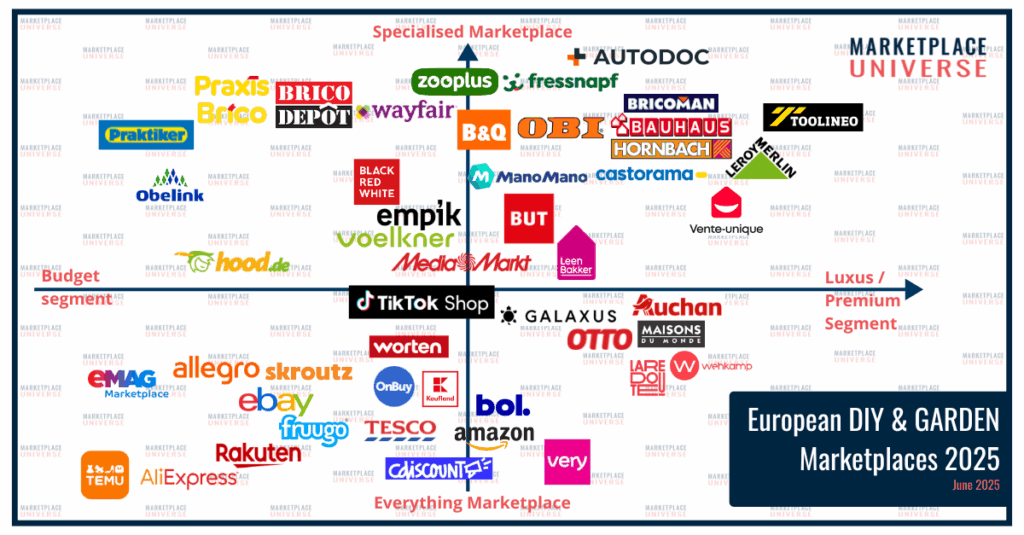
These are the 49 most relevant online marketplaces for DIY & GARDEN
Last update: 02. June 2025
While marketplaces in mature categories like fashion and electronics have entered a phase of consolidation—or in some cases, decline—the DIY & Garden segment is still in growth mode. New players are entering, established retailers are launching or scaling their platforms, and consumer behavior continues to shift toward online discovery and fulfillment for home improvement, outdoor living, and pet-related DIY needs.
Our updated Marketplace Quadrant DIY & Garden now includes 49 marketplaces across Europe, capturing both the generalists that have historically dominated this space and the growing wave of specialist retailers that are now investing heavily in platform strategies.
Why service matters more than price
Unlike other retail segments, the usual split into “budget” vs. “premium” doesn’t apply cleanly in DIY. A single retailer may sell high-end tools and entry-level paintbrushes in the same cart. That’s why we’ve adjusted our quadrant logic:
The X-axis positions marketplaces on a scale from low-touch budget platforms (price-driven, minimal support) to specialist retailers (higher service levels, expert advice, and project-driven sales strategies). It’s not about who’s cheaper, it’s about how much help the customer gets.
The most important players
The generalists
The traditional DIY trade was late to the marketplace game. In the meantime, generalist platforms secured major market share:
- Amazon dominates in Germany, France, the UK, Spain, and Italy
- eBay and AliExpress are strong across Northern and Southern Europe
- Temu is gaining visibility fast in the low-price DIY segment
- Local heroes like bol.com (NL), Galaxus (CH), Cdiscount and La Redoute (FR), and Allegro (PL) continue to perform well
- Skroutz (GR) and Very (UK) are now included for their relevance in their respective countries.
The specialists
A wave of large DIY retailers is now building out marketplace functionality—some from scratch, others through acquisition and integration. These include:
- B&Q/Kingfisher (UK): Strong growth and active partner onboarding
- Leroy Merlin and BRICOMAN (Adeo Group)
- Praxis and Brico (Maxeda Group, active in Benelux)
- In Germany, Hornbach, in March, OBI, have followed suit and are vigorously promoting their marketplaces. Bauhaus had to restructure after technical issues and is now at the brink of starting with a new software provider.
- Castorama and BUT: New additions strengthening the French landscape
These players are leveraging deep category expertise, strong offline logistics, and access to relevant brands to challenge generalists head-on.
For special and niche product ranges
While not all marketplaces in this quadrant are dedicated solely to DIY, several serve key subcategories:
- Zooplus: Now live with a functioning marketplace in France, relevant pet assortments – and directly competing with already established marketplace Fressnapf.
- Toolineo: B2B-focused but interesting for premium B2C power tool customers
- Obelink: Specialised in outdoor and camping, with overlap into DIY categories
- Autodoc: One of the biggest car parts online retailers in Europe launched their marketplace late last year – and is ready to take on market leader eBay with it.
- MediaMarkt: Relevant for any DIY product that comes with a plug
- Vente Unique, Maisons du Monde, wehkamp, Empik, Black Red White: All have overlapping assortments in outdoor furniture and garden decor
What changed since the last update?
In this version, we’ve cleaned up the quadrant and removed players that no longer fit the category or have exited the marketplace model:
Out:
- Darty – Focuses primarily on white goods, not DIY
- Vakante Veilingen – No longer relevant
- Argos – Not operating as a marketplace
- ePrice – Rapid decline in activity and relevance
- Etsy, Rue du Commerce, CDON – Either too niche or too focused on other categories
Conclusion: A sector still in motion
The DIY & Garden sector is not yet saturated in terms of marketplace maturity. If anything, it’s just getting started. Generalists still hold much of the volume, but retailers with category expertise are catching up fast—and working to transform their platforms from product catalogues into project-focused ecosystems.
As marketplace infrastructure and seller onboarding improve, the next wave of competition could be about more than product listings—it could be about guiding customers through full renovation or outdoor projects, not just selling drills and decking boards.
Have we missed a marketplace? Do you have any input to add to our quadrant? Let us know!